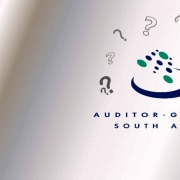|
Getting your Trinity Audio player ready...
|
Capable leaders should demonstrate change by strengthening transparency and accountability.
This is the call from Auditor-General (AG) Tsakani Maluleke, who earlier today tabled the 2020-21 Municipal Finance Management Act (MFMA) audit outcomes in the National Assembly.
The usual five-year comparison period encompasses the entirety of the administration that took office in 2016, with local government elections on 1 November 2021 signalling an end to that administration. This is a chance to change the status quo, said Maluleke.
“The new administration must instil a culture of performance, accountability, transparency and integrity,” she said. “This, in turn, will enable these municipalities to be accountable to the communities they serve.”
Above all, she added, communities want to see their elected representatives and municipal officials act with integrity, being honest, ethical and incorruptible, and complying with legislation.
But as with previous audits, the few bright rays of hope were clouded by the same grim story that has been told over many years and many reports. Overall, said the AG, only 61 municipalities out of the total of 257 had a better audit outcome in 2020-21 than in 2016-17, with 56 showing a worse audit outcome. Some municipalities had managed to improve their outcomes, only to regress again in later years, she added.
While it is encouraging that the number of municipalities receiving clean audits (see below for explanation of audit outcomes) has increased slightly, the report noted – 41 this year compared to 32 in the 2019-2020 cycle – this number still represents less than 20% of the total municipal budget.
Of the 41 municipalities, 27 were able to maintain a clean audit status over the five-year term of the previous administration. In addition, 14 achieved a clean audit for the first time, but six lost their clean audit status over the five-year period.
A clean audit should not be undermined or underestimated, said Maluleke. “It is an important foundation for a municipality to deliver much-needed services to communities and spend scarce public resources prudently to improve their lived experiences.”
Positives outweighed by negatives
This positive outcome is soundly negated by unacceptable facts showing that most municipalities are still in the foothills of the mountain they have to climb to achieve good governance.
In 2021, the Department of Cooperative Governance reported that 64 municipalities were dysfunctional because of poor governance, weak institutional capacity, poor financial management, corruption and political instability.
In June 2017, eight municipalities were under administration or provincial intervention. By June 2021, 23 municipalities were in the same position, and this increased to 33 municipalities by February 2022.
“This means that these municipalities had become so dysfunctional that national and/or provincial government had to step in to try and restore governance, financial management and service delivery.”
Failure to implement recommendations, the excessive and costly use of consultants to cover basic skills that finance units should but do not have, and a profound lack of will to investigate and address irregularities are just a few of the factors contributing to the bleak situation.
In terms of timely submission of financial statements by 31 August for auditing, the percentage worsened from 90% in 2016-17 to 82% in 2020-21.
This not only delays the audit processes, said Maluleke, but more importantly, also the accountability processes.
By the date of this report, nine audits had not been completed as the municipal managers did not submit the financial statements for auditing by the legislated submission date. Two of the municipalities were from the Northern Cape and seven were from the Free State. Five of the none submitted financial statements between March and May 2022, and the Auditor-General of South Africa (Agsa) is now busy with those audits.
Material irregularities
A material irregularity (MI) is defined as “Any non-compliance with, or contravention of, legislation, fraud, theft or a breach of a fiduciary duty identified during an audit performed under the Public Audit Act that resulted in or is likely to result in a material financial loss, the misuse or loss of a material public resource, or substantial harm to a public sector institution or the general public.”
These include non-compliance with procurement processes, failure to recover debt, fraud resulting in loss, non-submission of financial statements, and more.
The discovery of MIs allows the Agsa to refer material irregularities to relevant public bodies for further investigation, recommend actions in the audit report and take binding remedial action for failure to comply with recommendations, and issue a certificate of debt for failure to implement remedial action if financial loss was involved.
By 15 April 2022, the report stated, the Agsa was dealing with 185 MIs at various stages in the audit process. “We estimate the total financial loss of these material irregularities to be R3.9-billion, of which R1.6-billion was money lost by municipalities that had invested in VBS Mutual Bank.”
These material irregularities emerged in areas that were basic rather than complex, and which should be second nature to auditees – to procure at the best price, to pay only for what was received and derive the intended benefit from the money spent, to make payments on time, to recover revenue owed to the state, to safeguard assets and investments, to prevent fraud, and to comply with legislation.
Unwanted expenditure continues to increase
The balance sheet reflected a staggering R119.07-billion of irregular, unauthorised, and fruitless and wasteful expenditure. This is a substantial increase compared to the last audit’s total of R110.18-billion and furthermore, very little has been done to address the situation.
One reason for this is that irregular, unauthorised, and fruitless and wasteful expenditure is still not being investigated or addressed. This means that municipalities did not take sufficient steps to recover, write off, approve or condone such expenditure. In total, 51% of municipalities did not investigate the previous year’s irregular expenditure, 42% did not do so for unauthorised expenditure, and 41% failed to do so for fruitless and wasteful expenditure.
More than half of the implicated municipalities did not undertake investigations and where action was taken, it was mostly to write off the irregular expenditure. This means that the council considered the matter to be resolved – but the Agsa identified instances where these investigations were not appropriately performed.
Not only does this situation add to the increasing annual burden of unwanted expenditure, but it means that those responsible are not held to account. Investigations very seldom found any officials liable, the report noted.
Financial reporting
Despite the price tag of just over R11.67-billion spent on finance units and consultants, the key management controls of municipalities were not adequate to prevent material misstatements in the financial statements, the report noted.
“Despite us reporting shortcomings and providing recommendations over the years as well as numerous and costly national and provincial initiatives and interventions, the poor status of key financial management controls shows that municipalities have not yet mastered financial reporting – 75% of municipalities were not able to submit quality financial statements for auditing.”
The most common misstatements in the financial of municipalities with qualified, adverse or disclaimed opinions included:
- Receivables (27%): Municipalities did not know the correct amount due to them (receivables) and whether they were still entitled to receive the amounts due. In some cases, the value of the receivables recorded was not accurate.
- Property, infrastructure and equipment (27%): Municipalities could not properly account for their assets because asset registers were not updated with assets purchased, under construction, disposed of, stolen or vandalised. In some cases, the value of the assets recorded was incorrect despite the use of consultants.
- Irregular expenditure (27%): Municipalities did not report all irregular expenditure that should have been reported in their financial statements. In some cases, the amount of the irregular expenditure reported was incorrect.
- Revenue (27%): Municipalities did not have adequate documentation to support the revenue billed; and not all of the revenue that should have been billed to residents for services rendered had been billed. In some cases, amounts billed for services rendered were recorded incorrectly.
- Expenditure (25%): Municipalities did not have adequate documentation to support the expenditure reported. In some cases, they did not record all the expenditure that should have been recorded.
Poor governance, instability, accountability failures, and more
South Africa’s Constitution envisages a life of dignity and equality for citizens, where they have access to clean water, sanitation, electricity, refuse services, and good roads and infrastructure. A country where their elected representatives in council will ensure that the rates and taxes they pay and the funds provided by national government for basic services and infrastructure development are accounted for and used for their intended purpose.
“Sadly, this is not the lived reality of most citizens in the country,” said Maluleke. “Local government is characterised by accountability and service delivery failures, poor governance, weak institutional capacity, and instability.”
The financial position of 28% of South Africa’s municipalities is so dire that there is significant doubt whether they will be able to continue operating as a going concern in the near future.
While municipal employees continue to rake in their monthly salaries, it is the people they are mandated to serve – the communities who place their hope and trust in incompetent, lazy or corrupt officials – who always end up suffering the consequences.
Audit outcomes
1. A financially unqualified opinion with no findings (clean audit) means the municipality:
» produced quality financial statements free of material misstatements (in other words, errors or omissions that are so significant that they affect the credibility and reliability of the financial statements)
» produced quality performance reports that measure and report on performance in a manner that is useful and reliable
» complied with key legislation.
2. A financially unqualified opinion with findings means the municipality was able to produce quality financial statements, but struggled to produce quality performance reports and/or to comply with all key legislation.
3. A financially qualified opinion with findings means the municipality’s financial statements contained material misstatements that were not corrected before the financial statements were published. The municipality also had challenges with the quality of the performance report and/or compliance with key legislation.
4. The financial statements of a municipality with an adverse opinion with findings included so many material misstatements that we disagreed with virtually all the amounts and disclosures in the financial statements.
5. A municipality with a disclaimed opinion with findings could not provide us with evidence for most of the amounts and disclosures in the financial statements. We were therefore unable to conclude or express an opinion on the credibility of the financial statements.
Municipalities with adverse and disclaimed opinions are typically also unable to provide sufficient supporting documentation for the achievements they report in their performance reports and do not comply with key legislation.








